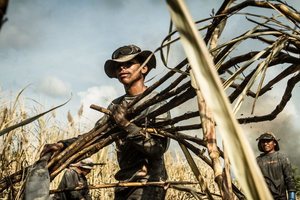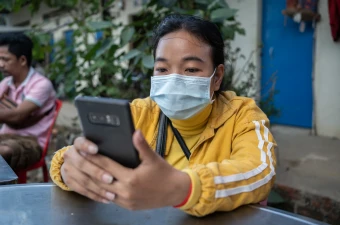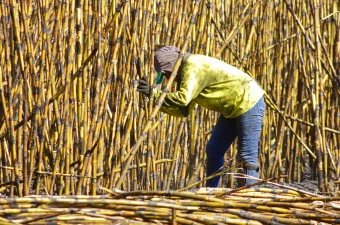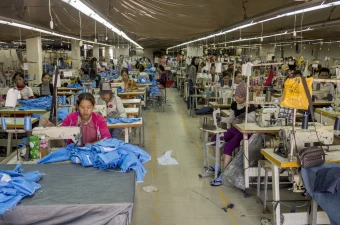
In the report ‘Give them a break, the bitter consequences of poor working conditions in the Central American sugarcane industry’, CNV Internationaal, the Central American Institute for Social Studies (ICAES) and FairFoodreveal the issues sugarcane workers are facing – including the deadly kidney disease CKDnT – and explain what companies like Bacardi can do to improve, and sometimes save, the workers’ lives. The three civil society organisations are calling upon sugarcane producers, buyers as well as local and EU governments to take positive action to improve, and rescue, the lives of thousands of workers employed in the sugarcane industry.
Key recommendations for sugarcane buyers
- Have in place a global sugarcane supplier code of conduct or similar that applies to all supplier contracts which includes:
- all applicable domestic and international laws and standards relevant to the issue including, but not limited to, the ILO Conventions on Freedom of Association and Protection of the Right to Organise (87), the Principles of the Right to Organise and to Bargain Collectively (98); and the Right to a Safe and Healthy Work Environment (155);
- additional explicit protections for physical labourers working in high heat conditions equal or similar to the United States Occupational Safety and Health Agency (OSHA) Guidelines on heat stress (Water.Rest.Shade. program);
- a clear statement that all rights and requirements of the code apply equally to all workers at the ingenios regardless of whether they are part/full-time, temporary/permanent workers and/or directly employed or subcontracted and;
- a guarantee that a reduction in the number of hours worked by an employee pursuant to new compliance with the explicit protections for physical labourers (detailed above) will not under any circumstances result in a reduction in the amount of income currently received by that employee and will in no instance be less than the domestic agricultural minimum wage.
- Implement an ongoing credible and effective assurance mechanism to ensure that all global sugarcane primary, secondary and tertiary suppliers are complying with the supplier code of conduct, and therefore all of the new standards included therein. This assurance mechanism should include independent third party audits[i];
- Uphold supply chain loyalty and to ensure that the buyers’ suppliers commit to supply chain loyalty with respect to producers and producer countries, i.e., continue sourcing from current producers;
- Offer fair and credible compensation to the cost bearers for the extra expenses caused by compliance with each of the key changes described.

Key recommendations for sugarcane producers
- Have in place health and safety standards as well as responsible sourcing standards or similar that apply to all supplier contracts, which include:
- all applicable domestic and international laws and standards relevant to the issue including, but not limited to, the ILO Plantations Convention (110), the ILO Conventions on Freedom of Association and Protection of the Right to Organise (87), the Principles of the Right to Organise and to Collective Bargaining Collectively (98); and the Right to a Safe and Healthy Work Environment (155);
- additional explicit protections for physical labourers working in high heat conditions equal or similar to the United States Occupational Safety and Health Agency (OSHA) Guidelines on heat stress (Water.Rest.Shade. program);
- a clear statement that all rights and requirements of the health and safety standards and responsible sourcing standards apply equally to all workers at the ingenios regardless of whether they are part/full-time, temporary/permanent workers and/or directly employed or subcontracted;
- a guarantee that a reduction in the number of hours worked by an employee pursuant to new compliance with the explicit protections for physical labourers (detailed above) will not under any circumstances result in a reduction in the amount of income currently received by that employee and will in no instance be less than the domestic agricultural minimum wage and;
- Implement an ongoing credible and effective assurance mechanism to ensure that all stipulations above are complied with. This assurance mechanism should include independent third party audits, among others[ii];
- Uphold supply chain loyalty and to ensure that your suppliers commit to supply chain loyalty with respect to producers, i.e., continue sourcing from current producers;
Offer fair and credible compensation to the cost bearers for the extra expenses caused by compliance with each of the key changes described.
Key recommendations for sugarcane producers for government actors
For the Board on Trade and Sustainable Development of the Association Agreement
The Board of Trade and Sustainable Development is monitoring the implementation of the trade-related aspects of the Association Agreement including the sustainable development obligations.
- To thoroughly investigate the concerns outlined in this report and to take the necessary measures to ensure an effective and timely solution for the lack of compliance with the Multilateral Labour Standards and Agreements as contained in article 286 of the Association Agreement in the sugarcane industries in Nicaragua and Guatemala.
For the EU Party to the Association Agreement
- To request an official consultation with the relevant Central American Parties regarding the concerns related to the enforcement of the Multilateral Labour Standards and Agreements referred to in the Association Agreement in the sugarcane industry in Central America.
For the European Parliament
- To address these issues with the European Commission and question the implementation and monitoring of the sustainable development obligations as specified in the Association Agreement, in particular with respect to the implementation and enforcement of Multilateral Labour Standards and Agreements in the sugarcane industry in Central American member countries.
For the Nicaraguan and Guatemalan governments
- To effectively enforce the ratified American Convention on Human Rights, the ratified ILO’s Conventions on Freedom of Association and the Right to Organize Convention (nº 087), and the Plantation Convention (nº 110), part 9, article 54 on the right to organise and collective bargaining;
- To effectively enforce the ratified UN Covenant on Economic, Social and Cultural Rights, which requires them to ensure safe and healthy working conditions and a reasonable limitation of working hours;
- To ratify ILO Convention 155 on Occupational Safety and Health and ensure effective implementation and enforcement.
For the Nicaraguan government
- To renew their commitments to the ILO Decent Work programme and to ensure that the epidemic of CKDnT among sugarcane workers is ended.
Fairfood, ICAES and CNV Internationaal invite all stakeholders to come together in order to identify best practices within the industry and work collaboratively on establishing policies and practices to create positive change.
Only together we can change the lives of those working in the sugarcane industry!
To read the full report (english) El informe cana de azucar integral (espanol) [i] These third party audits should be unannounced, based on a representative sample and publicly disclosed. More specific information on this is available upon request. [ii] Ibid.
Publication date 19 08 2015


